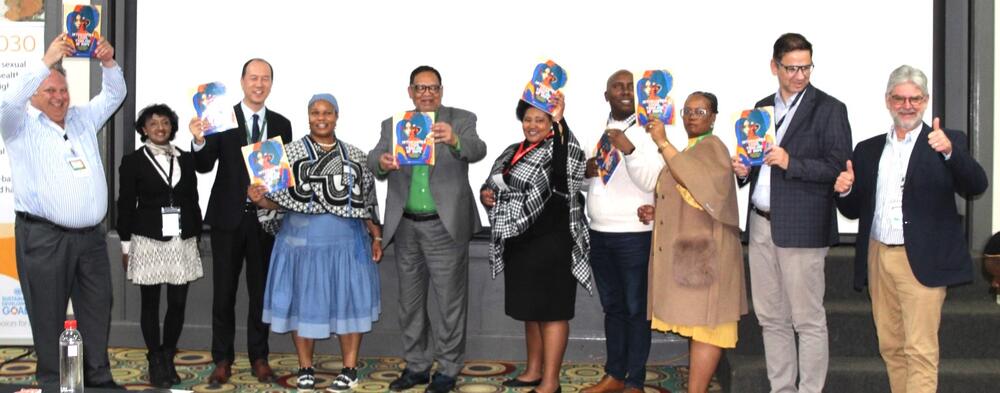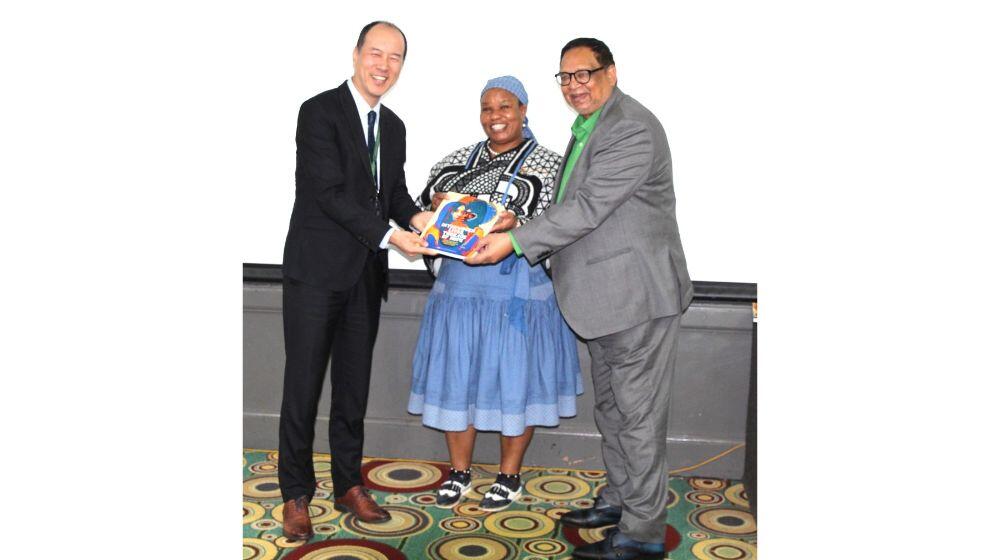Setting the scene, Mr. Jacques van Zuydam, Chief Director of the National Population Unit, enlightened participants on the purpose of the day. He noted that it was of importance to understand demographic trends and population dynamics in development plans, and advocate for evidence-based policies and interventions that are considerate of demographic trends and population dynamics. Additionally, he noted that it was also to demonstrate how population data can be effectively integrated into development policies, strategies, programmes and projects through case studies and examples of the integration of population information into development plans, highlighting best practices, and provide a platform for some NWU current students to present their research projects.
UNFPA Representative, Mr. Yu Yu, shared a message of support and also supported the launch the State of the World Population Report – which he added is the second most read report produced by the UN as at today. He suggested that South Africa, despite its historical and current challenges, is a global leader in the field. He further underscored the importance of addressing demographic trends, recognising demographic diversity and noting the interlinkages between population issues and development across all regions. Mr. Yu Yu suggested that the State of World Population Report calls on Governments to use science, data, statistics and strategic foresight to ensure long-term thinking and evidence-based decision- making. He reflected on the present capacity within South Africa, where he believes there is a great opportunity by multiple sectors to collaborate, create and strengthen a foresight lab to look into future issues and prepare to mitigate the risks
for development in the decades to come.
Sharing information on the Post-Graduate Diploma (PGD) in Population Policy Analysis, Dr Tsawe, from the North-West University mentioned that the PGD is one of the only three global programmes focusing on population policy analysis. South Africa joins Egypt and China in this regard. 2024 marks 10 years of the programme, a significant milestone indeed. He noted that since the inception of the programme, thirty-eight participants from across Africa and fourteen from South Africa were successfully trained.
The MEC for Social Development in the North West, Ms. Dantjie began with honouring the work that has been done in the years before, referring to the Mafikeng Declaration of 2007 as one of the significant initiatives which has borne fruit in the form of the post-diploma at the North West University. The MEC reiterated her support for the programme, particularly with regard to Open Distance Learning and encouraged students and especially politicians to attend the programme. We were also reminded that our democracy is maturing as evidenced by the ushering of the Government of National Unity. People remain a priority of the GNU, especially people in the deep rural areas of the North West and elsewhere which makes the role of inclusive data all the more important.

The highlight of the morning was the keynote address given by Mr. Ganief Hendricks, the Deputy Minister of Social Development, who started his remarks on the knowledge hierarchy which was a useful tool to understanding how data and information can be organised. He put forward that the 2024 World Population Day theme also ponders on the golden rule of the Sustainable Development Goals agenda, including, our own National Development Plan Vision 2030 with the promise to leave no one behind.
And, to realise this promise, there is a need for a timely, credible, reliable, verifiable, comprehensive, well-disaggregated, and geo-referenced data. This will help us to gain a better understanding of who the people that make up the numbers are, where they are residing, what circumstances they are in, what their ages and needs are. That is where data generating institutions and researchers become more important in diverse sourcing, collection and capturing data.
The Deputy Minister emphasized that making data available, to decision-makers, planners, civil society organizations, businesses and citizens helps to shape policies, direct actions, advise on development options, and permit governments to be held to accountable, in a way that truly reflects the population needs. Inclusive data means that the data we collected or intend to collect should give account of all people and groups, regardless of their age, gender, ethnicity, and location.
The Deputy Minister also drew attention to the annual commemoration of the International Day of Older Persons. As older persons are one of society’s most diverse groups; a multisectoral, collaborative, proactive and effective policy response is a must. The rise in the number of elderly persons has
implications for planning and policy formulation, especially about the health and social safety nets that need to be provided. The Deputy Minister also drew attention to the plight of homeless older persons where we must do more to support them. It is important for planners to understand how the ageing population in South
Africa is evolving so that they can inform interventions towards development and policy decisions.
The Deputy Minister ended his keynote address by noting that reliable population data are more important than ever and must be used to reach and respond to the needs of those who have been left behind. New and innovative data tools can bring invisible issues to light and illustrate the full picture of people’s experiences.
The afternoon session kicked- off with valuable reflection on 30 years of population statistics within democratic South Africa by Mr. Diego Iturralde from Statistics South Africa. The main message of his presentation was that we must “collect, share and make use of data that enables the country to make decisions and develop intervention that are based on sound evidence”. The presentation also shared demographic trends. Key trends included on South Africa’s population growth, its age structure, life expectancy and median age. On older persons, the elderly have seen the largest growth rate for the period 2002-2024 and are the fastest growing cohort in the population. Child dependency is on the decline as the fertility rate declines and life expectancy rises. Old age dependency has increased due to better health outcomes. On population and health, Mr. Iturralde touched on a bit of history for data in this field.
The county has come a long way and now various population, and health indicators can be acquired which are used to report on towards global and regional monitoring frameworks. Trends reflected on in this part of the talk included adolescent birth rates, comparison of planning status of births for the SADHS 1998 and 2016.
Maternal mortality has decreased due to various health interventions after spikes between 2007 and 2009. For the leading causes of death, we heard that COVID-19 is ranked number one for male deaths in 2020 and number 2 for females.
He also reflected on the demographic dividend, where he explained that the window of opportunity will be open until the dependency which resided with the youth shifts to that of the elderly. To benefit from the dividend, we need to invest in the main domains of the dividend. He also emphasised the concept of demographic resilience as a key link to the theme for World Population Day.
Lastly, Dr Mkwananzi Commissioner at National Planning Commission gave a background on the National Planning Commission and its mandate. Related to our theme of the day, the National Planning Commission is mandated to undertake research and build a body of evidence on critical matters for long term planning and development of South Africa as well as to strengthen the use of evidence and the quality of empirical data, generated from impact assessments for national planning. Importantly, it is through collaboration with various stakeholders and utilisation of data from different sources has allowed the National Planning Commission to produce myriad reports covering the strategic objectives of reducing unemployment and inequality and eliminating poverty amongst others.
In addition, she further noted that it is encouraging that South Africa has one of the most competent national statistical offices in the region, which is an example for countries to learn from. Whilst data is available from national surveys covering various developmental issues, more must be done to have these surveys and data freely available to the public. However, she cautioned, even with the provision of accessible data, the use of data is not yet optimal, and efforts are needed for the data to be effectively used in the process of planning and policymaking.
That said, Dr Mkwananzi also provided a sobering reality regarding funding which affects human resources, skills in this critical space of data production and use. Again, touching on the availability of data, difficulties experienced in accessing some data results in the discouragement of such data, thus affecting an inclusive approach to planning. Related to this, are the data gaps, inadequate time span of data, omission of essential variables, as well as certain groups not represented adequately impacts on the inclusivity of planning and policy making.
All-in-all, the World Population Day event wrapped up on a high note with the audience gaining valuable insights, having meaningful discussions, and leaving people inspired to make a difference!


